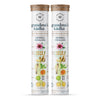Herbs and spices encompass various plant parts such as leaves, roots, flowers, stems, berries, and barks. Throughout history, they have served multiple purposes, including coloring, flavoring, and preservation in both medicine and nutrition. Ayurveda, the traditional alternative medicine system, harnesses the power of these natural elements to treat various ailments. Our grandparents have relied on this ancient wisdom for generations, effectively addressing numerous health disorders, and some of these remedies remain relevant even today.
Despite the advancements in modern science, lifestyle-related diseases are becoming increasingly prevalent. To confront the health challenges of our time, it is imperative that we delve into the ancient knowledge of Ayurveda passed down through generations. By exploring the wisdom of our ancestors, we can discover potential solutions for our contemporary health issues.
Best of Both Worlds
The amalgamation of Ayurveda and Modern medicine has gained popularity owing to the pandemic and increased awareness of the limitations or potential side effects of excessive use of allopathy. Ayurveda is an ancient traditional system of medicine that focuses on holistic health and well-being using the right Ahara (diet) or Anna (food). The word "ayurveda" means "knowledge of life." As per Ayurveda, the human body (physical entity) is made up of four components: Dosha (body type), Dhatu (tissue), Mala (waste products), and Agni (digestive/metabolic fire). It focuses on striking a balance between these components with the use of various herbs, roots, plants, spices, etc. to treat different ailments. The ancient sages, with their great understanding of the therapeutic effects of herbs and spices, produced one of the first known decoctions, known as kadha. Let us look at a few of the commonly used herbs and spices in Ayurvedic Kadha and learn about their role in treating modern health ailments.
1. Tulsi:
Typically found in almost every Hindu home, this plant symbolizes protection and is known as the queen of herbs for a reason. It exhibits an array of health benefits like antimicrobial, anti-diarrheal, anti-cataract, antioxidant, anti-hypercholesterolemia, antidiabetic, cardioprotective, neuroprotective, hepatoprotective, anti-allergic, mosquito repellent, antidepressant, anti-asthmatic, anti-thyroid properties, etc.
2. Turmeric:
Hidden in every Indian kitchen spice box, its health benefits are popular worldwide. For centuries, turmeric has been used for dispelling worms, improving digestion, regulating menstruation, promoting wound healing, dissolving gallstones, relieving arthritis, etc. It is also used as a blood purifier and as a topical application for treating skin conditions. This golden spice is often mixed with milk or water to treat sore throats or gastrointestinal disorders.
3. Black Pepper:
Black pepper has a greater role than imparting flavor, aroma, and spice to your food. Packed with a bioactive ingredient named piperine, it serves as an antioxidant, antimicrobial, and gastroprotective agent. Due to its free radical scavenging properties, it may also help reduce the growth of tumor cells. Additionally, the piperine compound of black pepper also helps boost nutrient absorption and cognitive brain functioning.
4. Amla:
Also known as Indian gooseberry, all parts of the plant are used for medicinal properties. It is also used as a tonic to increase vitality and vigor. The rasayna (nutrient fluid) of this plant is used to treat jaundice, diarrhea, and inflammation, whereas the rest of the plant exhibits antidiabetic, hepatoprotective, hypolipidemic, anti-bacterial, antioxidant, antiulcerogenic, and gastroprotective properties.
5. Dry Ginger:
The pungent properties of gingerols from ginger are thought to be responsible for their medicinal benefits. It is commonly used for motion sickness, nausea, and other gastric discomforts like gas, bloating, and indigestion. A dried version of its root, also known as "sonth", provides more benefits than fresh ones. Dried ginger showed the strongest antioxidant activity owing to its polyphenol content. Studies have shown that dried ginger suppresses the growth of colorectal cancer cells and gastric adenocarcinoma cells. Ginger also acts as a broncho-relaxant and helps in the treatment of asthma and other airway disorders.
6. Mulethi:
This small perennial herb, also known as licorice, possesses antimicrobial, antiparasitic, anti-inflammatory, anti-cancer, and immuno-enhancing properties. Thus, it has been used traditionally to treat many respiratory disorders such as asthma, sore throat, tonsillitis, and cough, along with stomach ulcers, skin diseases, rheumatism, jaundice, etc.
All these herbs are mixed to form a well-known ayurvedic drink known as Kadha to help boost immunity and treat common coughs and colds. While the monsoon brings about an array of illnesses, unfortunately, those living in this fast-paced world rarely have time to prepare this concoction. But this doesn’t mean you can’t reap the Ayurvedic goodness. You can buy kadha online that contains a blend of all the vital herbs in the right doses.
These immunity booster supplements are available in powdered versions, while others are in tea mix forms. Some of these are also available as water-soluble fizz tablets. These effervescent tablets are not just instant and effective but exceptionally tasty as well, as compared to the traditional homemade kadha. However, make sure to check with your doctor before adding any new supplements to your regimen.
Wrapping Up
For centuries, ayurveda has been used to treat common ailments, and now it’s merging with science to create products that keep up with this fast-paced life. Immunity booster supplements like Grandma’s Kadha online are a prime example. Regular consumption of this ayurvedic drink can strengthen your immune system and offer prompt relief from flu-like symptoms such as a runny nose, scratchy throat, body aches, and weakness. Plus, it hastens bodily repair and recuperation. Additionally, because these herbs are adaptogenic, they improve your ability to manage stress. Go on and buy grandma’s Kadha online to make the most of this season.
References
https://opencommons.uconn.edu/cgi/viewcontent.cgi?article=1025&context=som_articles
https://www.ncbi.nlm.nih.gov/pmc/articles/PMC4815005/
http://www.ccras.nic.in/content/some-important-medicinal-facts-about-amla-phyllanthus-emblica-l
https://www.hopkinsmedicine.org/health/wellness-and-prevention/ginger-benefits




























 DOWNLOAD NOW
DOWNLOAD NOW
